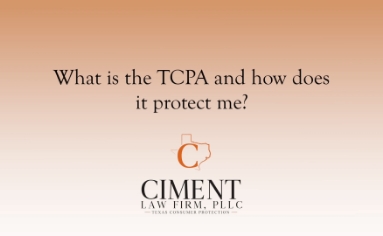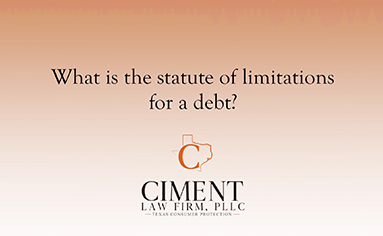We're here to help you.
info@cimentlawfirm.com

Debt Lawsuit Defense Lawyer In Dallas, TX
Getting calls from debt collectors is frightening enough, but they do not compare to receiving papers for a lawsuit. You are terrified of your day in court, and you don’t know what to do. You can alleviate the stress by hiring a debt lawsuit defense lawyer in Dallas, TX. An attorney will evaluate your case and mount a defense.
Strategies for a Debt Lawsuit Defense in Dallas, TX
Your debt lawsuit defense lawyer in Dallas, TX, will create a defense based on the evidence. Common defenses include:
Ask Us A Question, Tell Us Your Situation,
Or Schedule A Call With Us
Call (833) 637-1075 or fill out the short form below. We will respond on the same day if you’re reaching us before 5pm – otherwise, next business day. Don’t hesitate: We welcome your questions!
We respect your privacy. The information you provide will be used to answer your question or to schedule an appointment if requested.
Understanding The Statute Of Limitations For Debt Lawsuits
Creditors must file a lawsuit before the statute of limitations expires. The statute of limitations is four years in Texas, meaning that creditors have four years from the default date to file the suit. The lawsuit does not have to be heard within those four years. It simply must be filed. Some creditors might claim that you reset the clock on the statute of limitation if you made a payment after defaulting on the debt. However, Section 392.007 of the Texas Finance Code states that the clock does not restart if you make payment. Your debt lawsuit defense lawyer in Dallas, TX, will go over the evidence to see if you can get the case dismissed based on the statute of limitations.

Ignoring A Dallas, TX, Debt Collection Lawsuit
If you receive paperwork for a debt collection lawsuit, your first thought might be to ignore it. Ignoring a lawsuit will likely result in a default judgment. The judgment will allow the creditor to take additional action to collect the debt, such as garnishing your bank account. Instead of allowing a default judgment to take place, hire a debt lawsuit defense lawyer in Dallas.

Outcomes Of A Debt Lawsuit In Dallas, TX
Some debt lawsuits never make it to court. If the statute of limitations has passed, you have already paid the debt, or the debt isn’t valid, the Dallas debt lawsuit defense lawyer will attempt to get the case dismissed. If the debt is valid, your attorney can try to settle the debt before the court date. Otherwise, the case will go to court, where both sides will present evidence, and the judge will rule on the outcome.

Contact Our Debt Lawsuit Defense Lawyer In Dallas, TX
You don’t have to handle a debt lawsuit on your own. A Dallas debt lawsuit defense lawyer from the Ciment Law Firm will act as your advocate and protect your rights. Contact the Ciment Law Firm at 833-637-1075 to schedule a free consultation.

Why Choose The Ciment
Law Firm, PLLC?
- Free ConsultationFind out which debt resolution option is best for you during a free consultation.
- Positively ReviewedOur firm has numerous positive reviews on Google, Avvo, and other websites.
- Options for All NeedsFrom bankruptcy protection to judgment lien releases and student loan assistance, our firm provides ample options to resolve your debts.
- Experience on Both Sides of the FieldDaniel Ciment started his career at a debt collection law firm and now protects those in debt. His experience on both sides allows him to find solutions for his clients.
- Compassionate and TransparentPatient and knowledgeable, the team is available to answer all questions and explain the process so that clients can reach their desired outcome.
- Six Office LocationsSchedule your appointment at an office in Katy,

Statute Of Limitations For Debt Collection Lawsuits
Many people are surprised to learn that there is a statute of limitations for debt lawsuits. The statute of limitations in Texas is four years from the date of default. Unlike many other states, you will not reset the statute of limitations if you make a payment on the debt after the default date. Also, the collection agency must notify you when the statute of limitations has expired. Even though you can’t be legally sued after the statute of limitations has expired, some debt collections will still attempt to get a judgment in court. By using the statute of limitations defense, you can get the case dismissed.
Learn more
Getting Sued For A Debt After It Has Been Paid
Sometimes, people end up in court for a debt collection lawsuit after paying the debt. This generally happens when the creditor sold off the debt to a third-party collection agency. People pay the original creditor, not realizing the debt has been sold. The collection agency does not realize the debt has been paid, so it brings a lawsuit against the debtor. Providing proof of payment is a valid debt collection lawsuit defense. If payment has been made, the debt collection agency does not have legal recourse to collect additional money.

Debt Defense Lawsuit Outcomes
Debt defense lawsuits in Texas have four possible outcomes. Sometimes, lawsuits are dismissed before the case goes to court. For example, if the statute of limitations has passed, the legal team can get the case thrown out. Second, the debt lawsuit defense lawyer might negotiate a settlement for less than the amount owed. Third, the plaintiff might prove the debt and get a judgment for the full amount. Fourth, the defense attorney might invalidate the debt, so the judge rules in your favor. Hiring a debt defense lawyer is a vital step in reaching the desired outcome.

Don’t Ignore A Debt Collection Lawsuit
Ignoring a debt collection lawsuit is not wise. If the defendant doesn’t respond or appear in court, the judge can issue a default judgment in favor of the plaintiff. The court will also determine how the plaintiff can collect the funds. The court might allow the plaintiff to put a lean against the defendant’s homestead, garnish bank accounts, or seize non-exempt property. The judgment can also be reported to the three credit bureaus, hurting the consumer’s credit.
video faqs
GET A PERSONALIZED DEBT RESOLUTION SOLUTION how can the debt defenders help?











